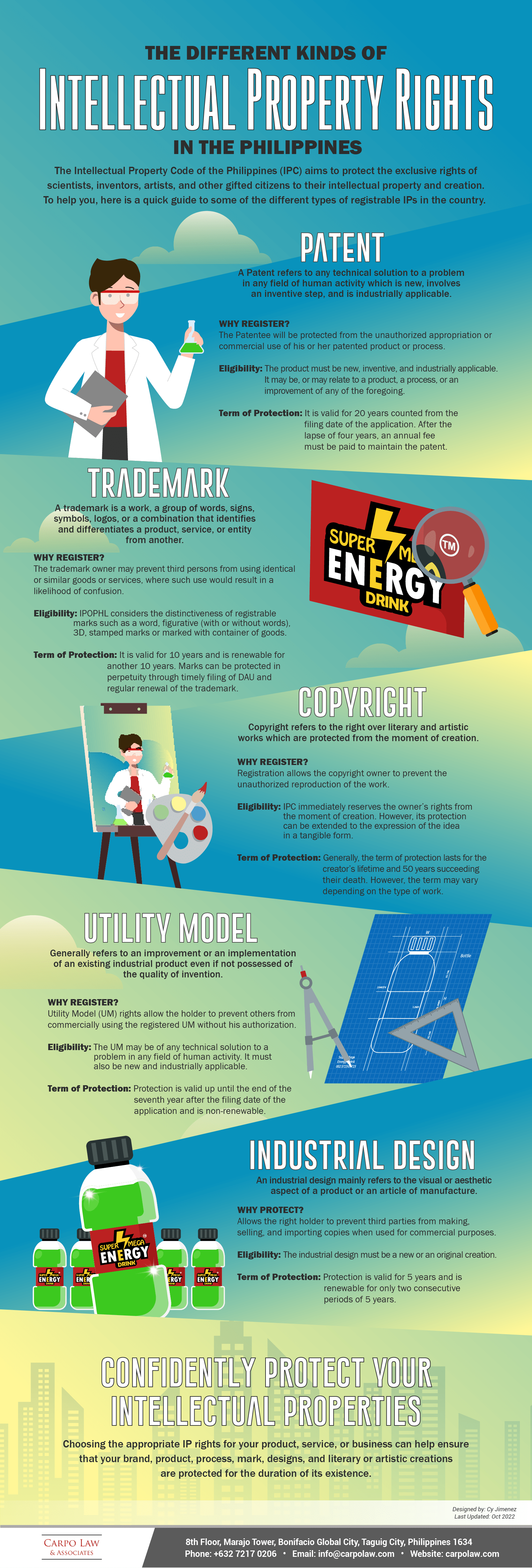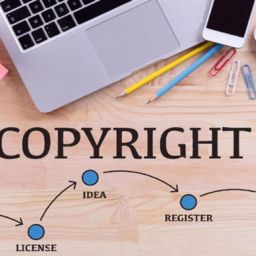
The Different Types of Intellectual Property Rights in the Philippines
The Intellectual Property Code of the Philippines (IPC) aims to protect the exclusive rights of scientists, inventors, artists, and other gifted citizens to their intellectual property and creation. To help you, here is a quick guide to some of the different types of registrable IPs in the country.
Patent
A patent refers to any technical solution to a problem in any field of human activity which is new, involves an inventive step, and is industrially applicable.
WHY REGISTER?
The Patentee will be protected from the unauthorized appropriation or commercial use of his or her patented product or process.
Eligibility
The product must be new, inventive, and industrially applicable. It may be, or may relate to a product, a process, or an improvement of any of the foregoing.
Term of Protection
It is valid for 20 years counted from the filing date of the application. After the lapse of four years, an annual fee must be paid to maintain the patent.
TRADEMARK
A trademark is a work, a group of words, signs, symbols, logos, or a combination that identifies and differentiates a product, service, or entity from another.
WHY REGISTER?
The trademark owner may prevent third persons from using identical or similar goods or services, where such use would result in a likelihood of confusion.
Eligibility
IPOPHL considers the distinctiveness of registrable marks such as a word, figurative (with or without words), 3D, stamped marks or marked with container of goods.
Term of Protection
It is valid for 10 years and is renewable for another 10 years. Marks can be protected in perpetuity through timely filing of DAU and regular renewal of the trademark.
COPYRIGHT
Copyright refers to the right over literary and artistic works which are protected from the moment of creation.
WHY REGISTER?
Registration allows the copyright owner to prevent the unauthorized reproduction of the work.
Eligibility
IPC immediately reserves the owner’s rights from the moment of creation. However, its protection can be extended to the expression of the idea in a tangible form.
Term of Protection
Generally, the term of protection lasts for the creator’s lifetime and 50 years succeeding their death. However, the term may vary depending on the type of work.
UTILITY MODEL
Generally refers to an improvement or an implementation of an existing industrial product even if not possessed of the quality of invention.
WHY REGISTER?
Utility Model (UM) rights allow the holder to prevent others from commercially using the registered UM without his authorization.
Eligibility
The UM may be of any technical solution to a problem in any field of human activity. It must also be new and industrially applicable.
Term of Protection
Protection is valid up until the end of the seventh year after the filing date of the application and is non-renewable.
INDUSTRIAL DESIGN
An industrial design mainly refers to the visual or aesthetic aspect of a product or an article of manufacture.
WHY PROTECT?
Allows the right holder to prevent third parties from making, selling, and importing copies when used for commercial purposes.
Eligibility
The industrial design must be a new or an original creation.
Term of Creation
Protection is valid for 5 years and is renewable for only two consecutive periods of 5 years.
Confidently Protect Your Intellectual Properties
Choosing the appropriate IP rights for your product, service, or business can help ensure that your brand, product, process, mark, designs, and literary or artistic creations are protected for the duration of its existence.


